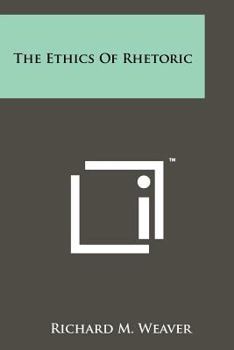The Ethics of Rhetoric
Select Format
Select Condition 
Book Overview
In The Ethics of Rhetoric, Richard M. Weaver evaluates the ethical and cultural role of rhetoric and its reflection on society. Weaver draws upon classical notions of rhetoric in Plato's Phaedrus, and... This description may be from another edition of this product.
Format:Paperback
Language:English
ISBN:1258205785
ISBN13:9781258205782
Release Date:October 2011
Publisher:Literary Licensing, LLC
Length:240 Pages
Weight:0.80 lbs.
Dimensions:0.5" x 6.0" x 9.0"
Customer Reviews
2 ratings
Well Worth The Investment
Published by Thriftbooks.com User , 16 years ago
Weaver's writing have inspired me over the years in many ways. One cannot read his work without aspiring to a more noble manner of life as well as aim for it. In this work, one is inspired toward the goal of eloquence in the pursuit of persuasion. Unlike a previous reviewer, I found Weaver's handling of Burke and Lincoln to be even handed. His analysis of their rhetoric cannot be entirely divorced from his own inclinations and I do not fault him for that. Like the first essay on the Phaedrus, Weaver does not accept the role of non-lover in his own rhetoric nor desire it of others. What Weaver does very well is open our eyes to what ought to be self-evident - that the manner of our argumentation, the style of our attempt to persuade, reveals much about ourselves and the "ethic" of our rhetoric. As such, at least with me, it forces us to re-examine that which indeed we do hold dear and what our objectives truly are. In a world where most people confess principle yet argue from circumstance, knowing the difference between the two enables us to avoid hypocrisy in ourselves and at the same time, understand the filters which govern other's hearing. Along the way, Weaver's examples, particularly his analysis of the Scope trials, awakens us to how rhetoric can function and how, just perhaps, a reawakening to it in in our culture, might immensely elevate the consciousness of our tribes. If the ethics of it were more widely regarded, the great issues of our day might indeed be discussed in a more compelling and enlightening manner.
An Unacknowledged Masterpiece
Published by Thriftbooks.com User , 23 years ago
Except for the final entry in this masterly collection of essays, "Ultimate Terms in Contemporary Rhetoric," which has been widely reprinted in anthologies, the contributions of Weaver, a late professor of rhetoric at the University of Chicago, are not generally known. Yet at his best, Weaver's essays bear comparison with those of his favorite George Orwell. Like Orwell, Weaver was one of the truest humanists of our age and hence really cannot be accurately described with our labels of left-wing, centrist, or right-wing. Exposing the vicious or stupid to champion the humanly valuable was his forte; having a seemingly unerring sensibility for doing this, Weaver is always able to surprise his readers, forcing them to hold little dialectics with themselves to discover their ultimate beliefs and terms of persuasion. Whether he is restoring to a central place in the educational experience and in political speech the role of Eros, or explaining why Edmund Burke was a liberal but Abraham Lincoln a conservative, Weaver is always both a shock and a joy to read.





